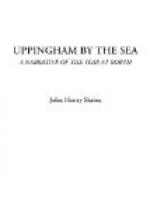Meanwhile, workmen in and round the hotel were as busy as stage-carpenters preparing a transformation scene. First, by the elimination of carpets and furniture, the interior was reduced to a tabula rasa. Then, in the somewhat weather-beaten top story, plastering and surface-washing went briskly on. Our hosts assured us no hands could be found for this work, but the Headmaster made a descent upon Aberystwith and returned with the required number. A contractor was fitting the large coffee-rooms, the billiard-room and others, and the ground-floor corridor from end to end, with long narrow tables—plain deal boards on wooden trestles—for the accommodation of three hundred diners. Outside, the stables were converted into the school carpentery, and the coach-house into a gymnasium. Above all, a wooden school-room, eighty-three feet by twenty, had been designed, and its site marked out on the north side of the enclosure behind the hotel.
Then there was the care of providing supplementary house-room for many purposes: rooms for music practice, and for the boys’ studies (of which we shall have more to say), and for hospital uses. Ordinary “sick-room” accommodation was soon obtained by paying for it, but a fever hospital was also a requirement which, with our experiences, we were not likely to forget, and this was less easy to secure. We had to scour the neighbourhood, knocking at the door of many a farmhouse and country homestead, before we were provided.
The house-room being secured, came the labour of furnishing; the distribution of tables, benches, bookshelves, &c, for the class-rooms, and of furniture (in many cases a minimum) for the needs of masters and their families; the ticketing of the bed-room doors, the beds, the chests of drawers, and each drawer in them, with the name of the occupant—with many like minutiae, which it took longer to provide than it does to detail them. The task was not rendered easier by being shared in part with our hosts, who had hardly taken the measure of our requirements. It became necessary at the last moment to telegraph to the Potteries for a large consignment of bed-room ware, which, in spite of protestations, had been laid in only in half quantities. The world of school has marched forward since the days when three or four basins sufficed for the toilet of a dozen boys.
While the elementary needs of the colony were being attended to, its more advanced wants were not neglected. There were those whom the anxiety of providing for the school amusements, and in particular its cricket, suffered not to sleep. We believe that the first piece of school property which arrived on the scene was the big roller from the cricket-field. Resolved to gather no moss in inglorious ease at home, it had mounted a North-Western truck, and travelled down to Bow Street station, where it was to disembark for action. It cost the Company’s servants a long struggle to land it, but once again on terra firma it worked with a will and achieved wonders, reducing a piece of raw meadow land in a few weeks’ space to a cricket-field which left little to be desired. This meadow lay within a few hundred yards of Bow Street station, four miles by rail from Borth. It is the property of Sir Pryse Pryse, of Gogerddan, who gave the school the use of it at a peppercorn rent.




